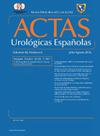尿道癌中成纤维细胞生长因子受体(FGFR)改变的生物学和治疗意义:从非侵入性肌肉疾病到转移性疾病的系统综述
IF 1.2
4区 医学
Q3 UROLOGY & NEPHROLOGY
引用次数: 0
摘要
FGFR3突变是尿路上皮癌(UC)中最常见的基因组改变之一,主要与管腔乳头状(肿块)亚型相关。随着成纤维细胞生长因子受体(FGFR)抑制剂的建立,UC的治疗正越来越多地转向个性化治疗。根据系统评价和荟萃分析指南的首选报告项目,使用Medline和科学会议记录进行了系统评价,以评估FGFR抑制剂与其他治疗联合治疗UC的潜在作用。正在进行的试验是通过ClinicalTrials.gov上的系统搜索确定的。在ClinicalTrials.gov网站上共收录了11篇全文论文、10篇大会摘要和5项试验。在BLC2001和THOR研究之后,厄达非替尼是唯一被批准用于转移性UC的FGFR1-4抑制剂,该UC在铂基化疗后易受FGFR2/3改变。根据队列2的THOR数据,erdafitinib不应推荐给符合条件且未接受免疫检查点抑制剂(ICIs)治疗的患者。一项3期试验目前正在评估膀胱内装置系统(TAR210)治疗fgfr改变的中度非肌肉浸润性膀胱癌(moonrise1)。临床前证据表明,可以考虑以联合为基础的方法来提高FGFR抑制剂在UC患者中的疗效。9项1b/2期临床试验的重点是FGFR抑制剂与ICIs、化疗或强制维多汀的联合应用。在转移性疾病中,一些初步分析报告了这些联合治疗的良好结果(例如NORSE和FORT-2试验)。然而,没有3期试验被终止,因此目前没有具有长期结果的1级证据支持FGFR抑制剂与ICIs、化疗或靶向治疗的联合。我们仍然需要更好地了解抑制FGFR信号通路的不同作用机制、最佳患者选择和治疗方法。本文章由计算机程序翻译,如有差异,请以英文原文为准。
Implicaciones biológicas y terapéuticas de las alteraciones del receptor del factor de crecimiento de fibroblastos (FGFR) en el cáncer urotelial: una revisión sistemática desde la enfermedad no musculoinvasiva a la metastásica
FGFR3 mutations are among the most frequent genomic alterations in urothelial cancer (UC) being mainly associated with the luminal papillary (LumP) subtype. With the establishment of fibroblast growth factor receptor (FGFR) inhibitors, the treatment of UC is now shifting more and more towards personalized medicine. A systematic review using Medline and scientific meeting records was carried out according to the Preferred Reporting Items for Systematic Review and Meta-analyses guidelines to assess the potential role of FGFR inhibitors in combination with additional therapies for the management of UC. Ongoing trials were identified via a systematic search on ClinicalTrials.gov. A total of 11 full-text papers, 10 congress abstracts, and 5 trials on ClinicalTrials.gov were identified. Following the BLC2001 and THOR study, erdafitinib is the only approved FGFR1-4 inhibitor for metastatic UC with susceptible FGFR2/3 alterations following platinum-based chemotherapy. According to the THOR data of cohort 2, erdafitinib should not be recommended in patients who are eligible for and have not received prior immune checkpoint inhibitors (ICIs). One phase 3 trial is currently evaluating the intravesical device system (TAR210) in FGFR-altered intermediate non-muscle invasive bladder cancer (MoonRISe-1). Preclinical evidence suggests that combination-based approaches could be considered to improve the efficacy of FGFR inhibitors in patients with UC. Nine phase 1b/2 trials are focusing on the combination of FGFR inhibitors with ICIs, chemotherapy, or enfortumab vedotin. In metastatic disease, some preliminary analyses have reported promising results from these combinations (e.g. NORSE and FORT-2 trial). However, no phase 3 trial is terminated, so there is currently no level 1 evidence with long-term outcomes to support the combination of FGFR inhibitors with ICIs, chemotherapy, or targeted therapies. A better understanding of the different mechanisms of action to inhibit FGFR signaling pathways, optimal patient selection and treatment approaches is still needed.
求助全文
通过发布文献求助,成功后即可免费获取论文全文。
去求助
来源期刊

Actas urologicas espanolas
UROLOGY & NEPHROLOGY-
CiteScore
1.90
自引率
0.00%
发文量
98
审稿时长
46 days
期刊介绍:
Actas Urológicas Españolas is an international journal dedicated to urological diseases and renal transplant. It has been the official publication of the Spanish Urology Association since 1974 and of the American Urology Confederation since 2008. Its articles cover all aspects related to urology.
Actas Urológicas Españolas, governed by the peer review system (double blinded), is published online in Spanish and English. Consequently, manuscripts may be sent in Spanish or English and bidirectional free cost translation will be provided.
 求助内容:
求助内容: 应助结果提醒方式:
应助结果提醒方式:


